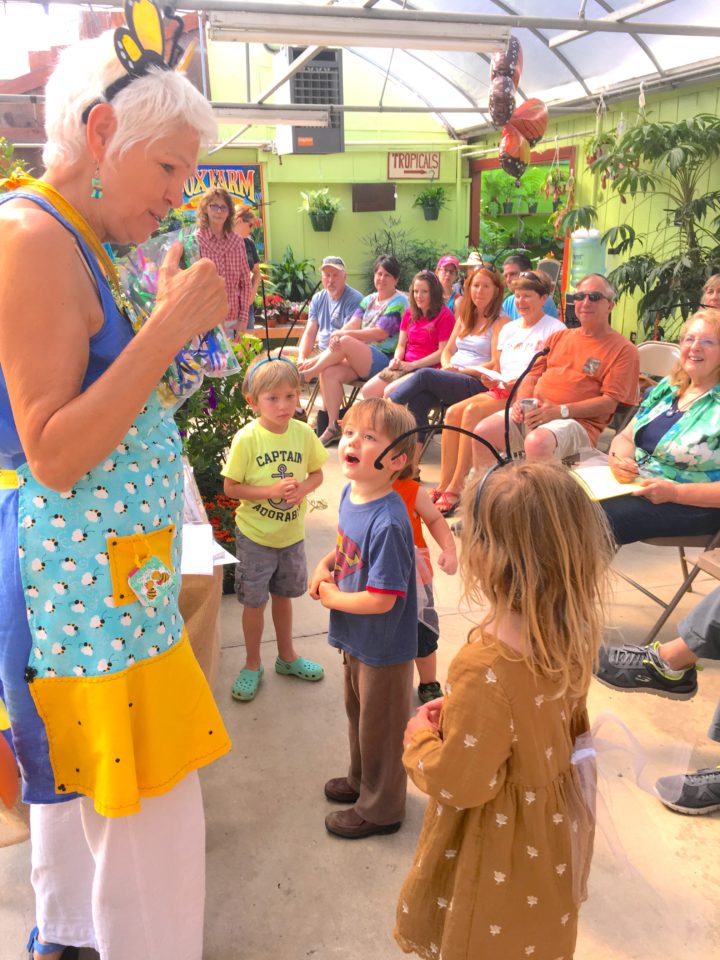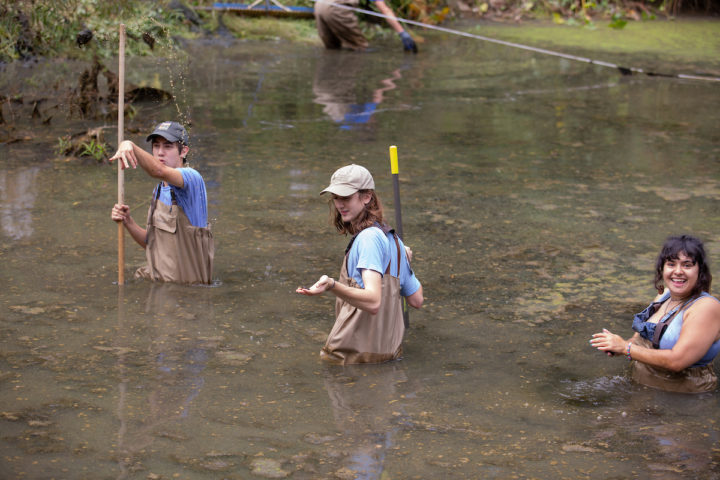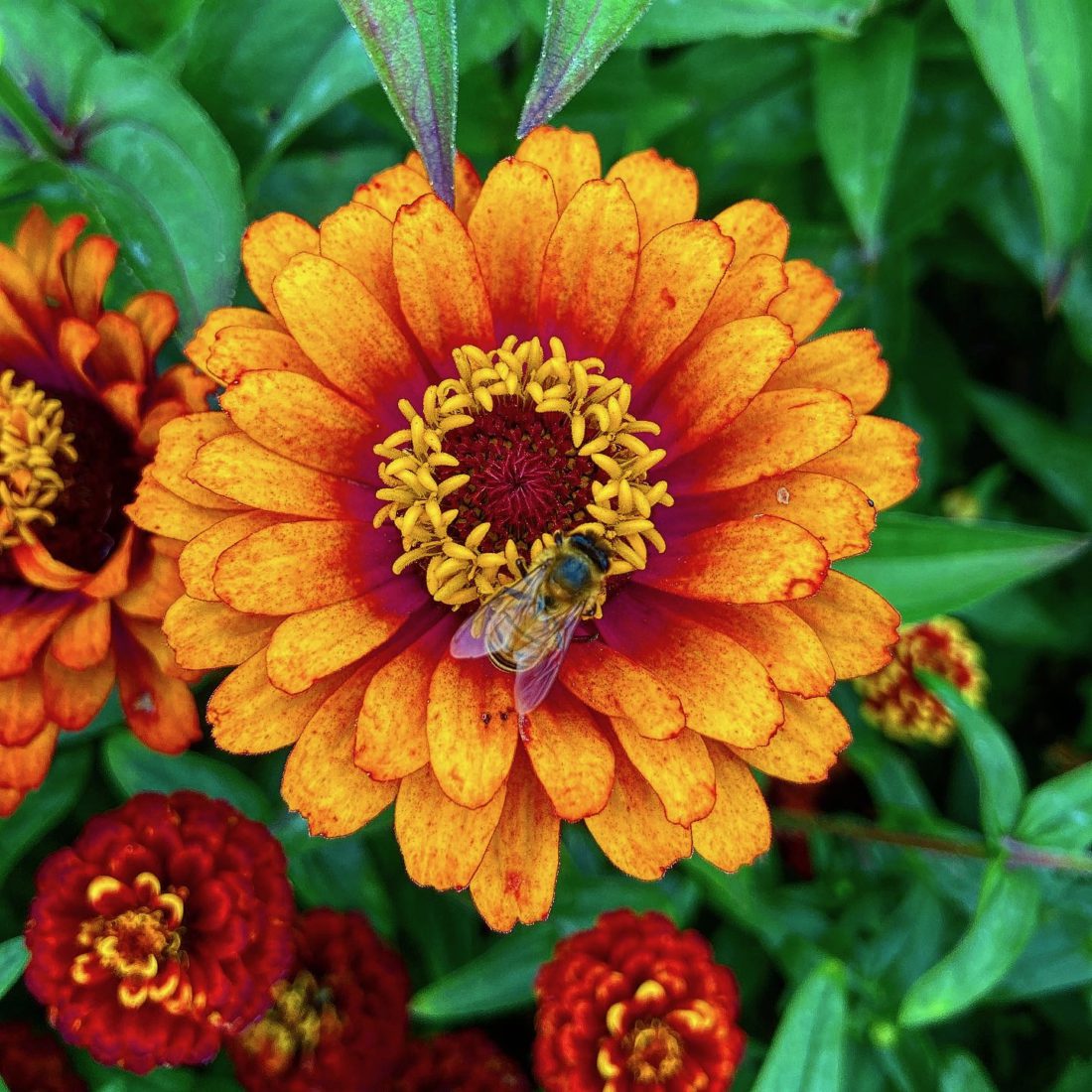“Let’s start with the sweat bee: They are beautiful.”
It doesn’t take much prodding to get Bee City USA founder Phyllis Stiles to wax poetic about Western North Carolina’s wild bees, beginning with the tiny, metallic green sweat bee.
“They are just gorgeous to watch, collecting that pollen and packing it on their back legs,” she says. “I have some great videos.”
Sweat bees, squash bees, mason bees, bumblebees, leafcutter bees, Southeastern blueberry bees — these are just a few of the more than 3,600 species native to the United States. The most efficient pollinators on the planet, bees are a vital component of the food chain. At least three-fourths of all flowering plants and one-third of the world’s food crops depend on bees and other animals to reproduce, the U.S. Department of Agriculture reports.
The fragile nature of this dependence became clear in the early 2000s, when the first instances of colony collapse disorder decimated the honeybee population. While this crisis drew plenty of attention to the honeybees’ plight, the majority of U.S. pollination is performed by wild, native bee species. (Europeans brought honeybees to North America in the 17th century.) And it was native bees that Stiles wanted to protect when she and a group of dedicated fellow “pollenteers” founded Bee City USA in Asheville back in 2012. On June 26 of that year, City Council passed a resolution proclaiming Asheville the nation’s inaugural Bee City.
Ten years later, 153 cities and 135 college campuses across 45 states have followed suit, becoming certified Bee City USA affiliates. Participants plant more bee-friendly native species and reduce pesticide use to help conserve these key pollinators. To honor this milestone, Bee City USA and its local administrator, Asheville GreenWorks, are holding a yearlong Pollination Celebration. Events include workshops, plant shows, guided walks and a day of activities at the “RAD Hab” pollinator garden on the Wilma Dykeman Greenway.
Bees, notes Stiles, “are at the very base of life on Earth. That’s why they’re so important.”
Becoming Bee City
Stiles wasn’t always wild about bees, mostly because she swells up quite a bit when stung. But after her husband, Richard, an avid gardener, decided to keep two honeybee hives in their backyard, she eventually agreed to go to “bee school” to get up to speed so she could help out.
“I was absolutely charmed,” she recalls.
The more she learned, though, the more she realized that pollination is primarily done by wild bees feeding off of native plants. Unlike honeybees — which Stiles calls “managed livestock” — wild species produce neither honey nor beeswax, and most live in solitary underground nests rather than aboveground colonies.
In short, keeping honeybees doesn’t benefit their wild cousins. “Would you have chickens to conserve birds? No, that’s not how you conserve birds,” she points out.
Accordingly, Stiles and a dozen other members of the Buncombe County Beekeepers Club came together in 2011 to brainstorm ways to help protect wild pollinators: mostly bees but also butterflies, hummingbirds and beetles. They ultimately came up with a certification program that cities could sign onto, and the following year, Bee City USA was born.
Creating a buzz
Since then, according to Asheville GreenWorks volunteer Nicole McNeill, the Asheville chapter of Bee City USA has certified 98 local pollinator habitats. It has collaborated with the city to install the first two of seven habitats planned for the Wilma Dykeman Greenway and has worked with multiple businesses and organizations.

Biltmore Estate planted wildflower borders on its grounds. The FEAST Program of Bountiful Cities, a nonprofit promoting food sustainability, participates in a monarch butterfly-tagging program for local elementary school gardens, and the N.C. Arboretum added a pollinator badge to its ecoEXPLORE program, encouraging kids in grades K-8 to spot and snap photos of pollinators to aid scientific research.
“Bee City helped us understand how important pollinators are and how a campus such as ours, even in a somewhat urban location, could play a role in pollinator conservation,” says Sarah Fraser, sustainability specialist at New Belgium Brewing. Native plants like blazing star and purple cornflower can be seen throughout the brewery’s 18-acre property, supporting pollinators while facilitating stormwater drainage.
Fraser singles out the partridge pea legume, a staff favorite because its buttery yellow flowers attract the more lemony-tinged cloudless sulfur butterfly. “They’re fast, erratic fliers, and it’s fun to see that plant come into flower and see those butterflies flitting around,” she notes.
Staff members also regularly plant milkweed, the sole food source for monarch caterpillars, capturing and raising a few so they can observe the metamorphosis from chrysalis to butterfly up close.
Backyard habitat
Complementing these broader organizational efforts are the neighborhood gardens and individual yards that are part of Bee City’s certified pollinator habitat program. When North Asheville resident Ayla Ficken first began planning her garden five years ago, she gave little thought to either native plants or pollinators — she just wanted rosebushes. Her friendship with Stiles, however, convinced her that she could make a difference, one plant at a time.
“If you love gardening, there’s no reason you can’t incorporate enough native plants,” she maintains. These days, her certified garden boasts colorful and aromatic native species like sweetshrub, phylox, black-eyed Susan and oakleaf hydrangea alongside her beloved roses.
She credits the resources Bee City USA provides with making the process so easy. A 24-page list of native plants details when they bloom, which pollinators they support and which local nurseries carry them.
Even the nurseries themselves rely on this list to make sure they’re providing the right plants. “It’s a great resource for us,” says Reems Creek Nursery marketing director Ruth Gonzalez. Although the Weaverville business has practiced pesticide-free cultivation and promoted native plants since its founding in 1979, the collaboration with Bee City USA took those efforts to another level.
“We hadn’t really made that connection between native plants and native pollinators having evolved together,” she says. “You’re going beyond just making a pretty garden that attracts butterflies: You have a pretty garden full of natives that is actually sustaining the native insect and pollinator population.”
Cross-pollination
In 2015, Bee City USA expanded its certification efforts to include colleges and universities, creating Bee Campus USA. When Jackie Hamstead, co-director of sustainability at UNC Asheville, heard about the program, she knew it would be a perfect fit. The school already had many pollinator conservation initiatives, both on its grounds and in its curricula, so getting certified as a Bee Campus provided an opportunity to formalize existing practices.

As opposed to the much larger public spaces cities typically oversee, “We manage 400 acres, and so it’s easier to feel like an individual can make a difference on that scale,” Hamstead explains. University grounds also provide research opportunities that are less readily available in urban public spaces. “Basically, our grounds serve as an extension of our classrooms and labs.”
Two recent UNCA projects highlight the kinds of innovative work that Bee Campuses can undertake more easily than Bee Cities can.
Last October, the university installed a floating wetland consisting of five plant islands in one of its stormwater ponds. Although the primary purpose is to filter pollutants such as nitrogen from the water before it drains into the French Broad River, incorporating native plants also creates pollinator habitat. “It’s cool to utilize what otherwise we would consider waste spaces,” notes Hamstead.
Meanwhile, on Dec. 15, students and faculty collaborated with the Asheville Fire Department to conduct a prescribed burn in the meadow just south of Mullen Park. The burn, she says, “maintains openings in the forest canopy, helps manage invasive species and releases nutrients into the soil, all of which can lead to larger blooms that benefit our pollinators.”
Busy bees
Since 2012, five other WNC cities have followed Asheville’s lead in becoming Bee City USA-certified: Boone, Hayesville, Hendersonville, Highlands and Laurel Park.
Despite the nonprofit’s impressive spread across the U.S. and even into Canada, however, grave threats to pollinators remain. A 2016 United Nations-sponsored report estimated that 40% of all invertebrate pollinator species are at risk of extinction due to the combined effects of climate change, pesticide use, invasive species and habitat destruction.
“Habitats are diminishing every day,” says Gonzalez. “So anything we can throw back into the mix, even if it’s just one small pot or a window box or your whole front yard, is going to be a great positive contribution.”
In fact, all it takes to become a Bee City USA-certified pollinator habitat are six native wildflower species (including one larval host), a shallow water source — even a moist sponge will do — and a $10 application fee.
But amid praise for how well designed the nonprofit’s programs are, Gonzalez, Ficken and others single out Stiles’ enthusiasm as a key factor in the initiative’s success.
“Because I love Phyllis dearly, I had to listen to what she was saying,” Ficken reveals. “She speaks with such conviction.”
For Stiles, though, it all comes back to the city’s willingness to take a chance on a brand-new initiative a decade ago.
“Asheville City Council could have said no,” she points out. “So the fact that they were willing to say yes was the birthing of this wonderful movement that is causing miracles to happen in communities all across America.”
Editor’s note: This article was updated April 11 to more accurately reflect Bountiful Cities role in the monarch butterfly tagging program. The article also wrongly attributed the 11th annual Black Jar International Honey Tasting Contest to BeeCityUSA; the annual happening is created and organized by Center for Honeybee Research.



Before you comment
The comments section is here to provide a platform for civil dialogue on the issues we face together as a local community. Xpress is committed to offering this platform for all voices, but when the tone of the discussion gets nasty or strays off topic, we believe many people choose not to participate. Xpress editors are determined to moderate comments to ensure a constructive interchange is maintained. All comments judged not to be in keeping with the spirit of civil discourse will be removed and repeat violators will be banned. See here for our terms of service. Thank you for being part of this effort to promote respectful discussion.